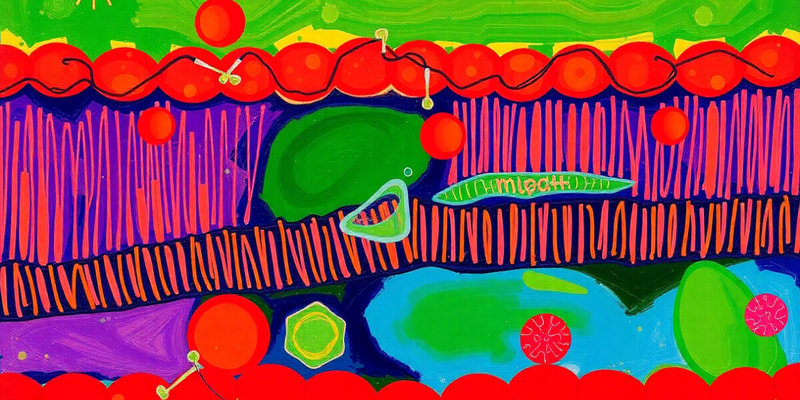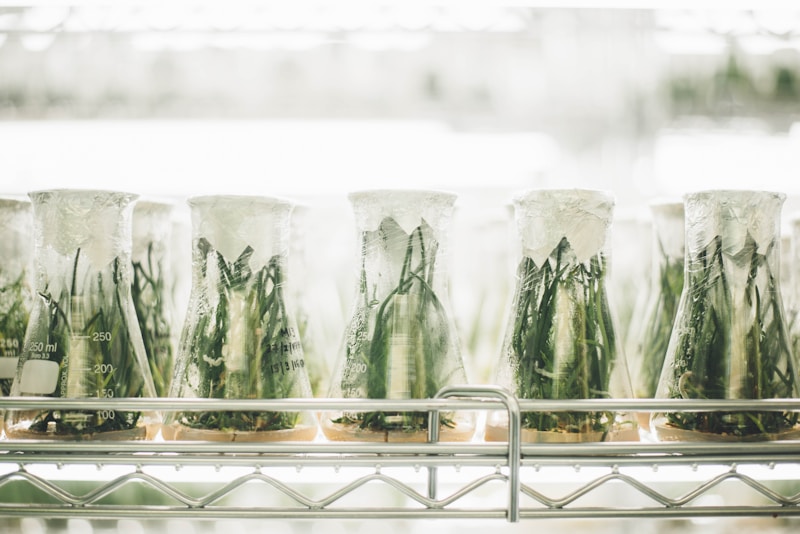Podcast
Questions and Answers
The body is organised into systems, tissues, cells, and ______.
The body is organised into systems, tissues, cells, and ______.
genes
One of the key transport processes across cell membranes involves ______ potentials.
One of the key transport processes across cell membranes involves ______ potentials.
bio-electric
The mechanism of glucose absorption is facilitated by the Na+/______ cotransporter.
The mechanism of glucose absorption is facilitated by the Na+/______ cotransporter.
glucose
Bulk uptake of ______ is different from regulated water uptake.
Bulk uptake of ______ is different from regulated water uptake.
Signup and view all the answers
According to studies, the biggest medical breakthrough of the 20th Century saved the lives of over ______ children.
According to studies, the biggest medical breakthrough of the 20th Century saved the lives of over ______ children.
Signup and view all the answers
Understanding one aspect of physiology can help in understanding other ______.
Understanding one aspect of physiology can help in understanding other ______.
Signup and view all the answers
Nerve physiology is a vital component of understanding the other ______ systems.
Nerve physiology is a vital component of understanding the other ______ systems.
Signup and view all the answers
Transport processes and bio-electric potentials form the basis for understanding system ______.
Transport processes and bio-electric potentials form the basis for understanding system ______.
Signup and view all the answers
Na+ can enter via the Na/Glu ______ and H2O will follow.
Na+ can enter via the Na/Glu ______ and H2O will follow.
Signup and view all the answers
The discovery of Na+/glucose co-transporter has saved over ______ children from death each year.
The discovery of Na+/glucose co-transporter has saved over ______ children from death each year.
Signup and view all the answers
Secretion of H2O is the opposite of absorption of ______.
Secretion of H2O is the opposite of absorption of ______.
Signup and view all the answers
The bulk uptake of water is facilitated by the Na+/Glucose ______.
The bulk uptake of water is facilitated by the Na+/Glucose ______.
Signup and view all the answers
Sweat is salty due to the export of ______ followed by H2O and Na+.
Sweat is salty due to the export of ______ followed by H2O and Na+.
Signup and view all the answers
The mechanism of glucose absorption involves the Na+/______ cotransporter.
The mechanism of glucose absorption involves the Na+/______ cotransporter.
Signup and view all the answers
Bulk uptake of water occurs through the ______ pathway in the gut.
Bulk uptake of water occurs through the ______ pathway in the gut.
Signup and view all the answers
In the kidney, the reabsorption of water mainly takes place in the proximal ______.
In the kidney, the reabsorption of water mainly takes place in the proximal ______.
Signup and view all the answers
Tight junctions in the small intestine and kidney tubules are somewhat '______'.
Tight junctions in the small intestine and kidney tubules are somewhat '______'.
Signup and view all the answers
Water is absorbed in healthy individuals as a constitutive ______.
Water is absorbed in healthy individuals as a constitutive ______.
Signup and view all the answers
Water flows up an osmotic gradient when there is sufficient ______ gradient.
Water flows up an osmotic gradient when there is sufficient ______ gradient.
Signup and view all the answers
The biggest medical breakthrough of the 20th Century is often attributed to improvements in ______ uptake.
The biggest medical breakthrough of the 20th Century is often attributed to improvements in ______ uptake.
Signup and view all the answers
H2O flows down its concentration ______.
H2O flows down its concentration ______.
Signup and view all the answers
Control of H2O movement in the body is essential for maintaining ______.
Control of H2O movement in the body is essential for maintaining ______.
Signup and view all the answers
Bulk absorption of water is a key function of the ______ in the gut.
Bulk absorption of water is a key function of the ______ in the gut.
Signup and view all the answers
The ______ of the intestine has a low concentration of glucose.
The ______ of the intestine has a low concentration of glucose.
Signup and view all the answers
______ is maintained at a high concentration in the lumen of the intestine.
______ is maintained at a high concentration in the lumen of the intestine.
Signup and view all the answers
Epithelial cells exhibit a ______ concentration of glucose.
Epithelial cells exhibit a ______ concentration of glucose.
Signup and view all the answers
The interstitial space has a ______ concentration of glucose.
The interstitial space has a ______ concentration of glucose.
Signup and view all the answers
The ______ pump helps keep intracellular Na+ low.
The ______ pump helps keep intracellular Na+ low.
Signup and view all the answers
The Na+/glucose co-transporter uses energy from the concentration ______ to transport Na+ and glucose into the cell.
The Na+/glucose co-transporter uses energy from the concentration ______ to transport Na+ and glucose into the cell.
Signup and view all the answers
A gradient for Na+ entry from the lumen is created by low ______ concentration inside the cells.
A gradient for Na+ entry from the lumen is created by low ______ concentration inside the cells.
Signup and view all the answers
Na/Glu ______ on the apical membrane assist in glucose absorption.
Na/Glu ______ on the apical membrane assist in glucose absorption.
Signup and view all the answers
Glucose enters the interstitial space via a glucose ______.
Glucose enters the interstitial space via a glucose ______.
Signup and view all the answers
Na+ enters the cells via the symporter down its ______.
Na+ enters the cells via the symporter down its ______.
Signup and view all the answers
Na+ and glucose contribute to the osmotic ______ within the cell.
Na+ and glucose contribute to the osmotic ______ within the cell.
Signup and view all the answers
Water leaves the lumen and travels through ______ tight junctions.
Water leaves the lumen and travels through ______ tight junctions.
Signup and view all the answers
The energy released from Na+ movement is used to move ______ into the cells against its gradient.
The energy released from Na+ movement is used to move ______ into the cells against its gradient.
Signup and view all the answers
The process of glucose entering the cells is supported by ______ transport mechanisms.
The process of glucose entering the cells is supported by ______ transport mechanisms.
Signup and view all the answers
In the kidney, regulated absorption of water takes place in the ______ collecting duct.
In the kidney, regulated absorption of water takes place in the ______ collecting duct.
Signup and view all the answers
In well-hydrated conditions, ADH levels are very low or ______.
In well-hydrated conditions, ADH levels are very low or ______.
Signup and view all the answers
AQP-2 is retained in the cytoplasm, while AQP-1 is located in the ______ membrane.
AQP-2 is retained in the cytoplasm, while AQP-1 is located in the ______ membrane.
Signup and view all the answers
In the regulated absorption process, tight junctions in the epithelial cells are ______ to water.
In the regulated absorption process, tight junctions in the epithelial cells are ______ to water.
Signup and view all the answers
Bulk absorption occurs in the ______ and kidney tubules.
Bulk absorption occurs in the ______ and kidney tubules.
Signup and view all the answers
The net movement of small volumes of water in the kidney occurs via the transcellular ______.
The net movement of small volumes of water in the kidney occurs via the transcellular ______.
Signup and view all the answers
Study Notes
Transport Across Cell Membranes
- Glucose and water absorption are crucial physiological processes
- Glucose absorption is mediated by the Na+/Glucose cotransporter
- This symporter utilizes the concentration gradient of Na+ to transport glucose against its gradient
- This energy-efficient mechanism is responsible for the bulk uptake of water in the gut and kidney tubules
- The Na+/Glucose cotransporter plays a significant role in maintaining osmotic gradients across the gut epithelium
- The tight junctions between intestinal epithelial cells are "leaky," allowing for the paracellular movement of water
- This bulk water absorption is a constitutive process in healthy individuals
- Regulated water uptake in the kidney collecting duct involves aquaporins (AQPs) and antidiuretic hormone (ADH)
- In a well-hydrated state, ADH levels are low, and AQP-2 is retained in the cytoplasm of epithelial cells, leading to dilute urine
- When dehydrated, ADH levels increase, promoting AQP-2 translocation to the membrane, facilitating water reabsorption and concentrated urine
Oral Rehydration Therapy
- Understanding the Na+/Glucose cotransporter led to the development of Oral Rehydration Therapy (ORT)
- ORT has saved millions of children from dehydration and death due to diarrhea
- This therapy effectively replenishes lost fluids and electrolytes, crucial for rehydration
Secretion of Water
- Sweating is an example of water secretion, the opposite of absorption
- Secretion of water utilizes Cl- export, followed by passive movement of water and Na+
- This process results in the production of salty sweat
- CFTR, a protein involved in Cl- transport, plays a critical role in sweating
Exocytosis
- Exocytosis is the process of releasing proteins or inserting membrane proteins into the cell membrane
- This mechanism is involved in the secretion of neurotransmitters, hormones, and other proteins
- Exocytosis also plays a vital role in the insertion of membrane proteins such as the Na+ pump
Studying That Suits You
Use AI to generate personalized quizzes and flashcards to suit your learning preferences.
Related Documents
Description
This quiz covers the mechanisms of transport across cell membranes, particularly focusing on glucose and water absorption in the gut and kidney. Learn about the Na+/Glucose cotransporter and the role of aquaporins and antidiuretic hormone in water regulation. Test your understanding of these critical physiological processes.



